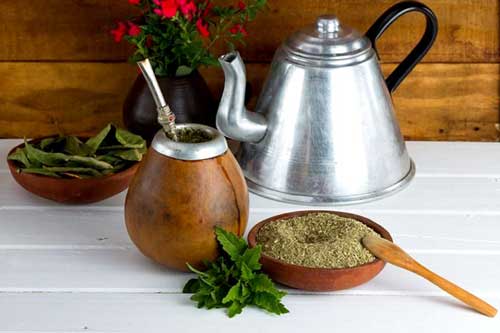Sports supplements marketed as endurance performance boosters often promise much, but frequently fail to deliver when placed under proper scientific scrutiny. That’s why supplements such as caffeine, creatine and carbohydrate are so notable in sports nutrition – they actually do what they say on the tin! However, the search for genuinely ergogenic sport supplements continues apace, and a recent study on an antioxidant-rich South American herb known as ‘yerba mate’ suggests a closer look is maybe worthwhile. Yerba mate – widely drunk as a tea across the continent – is very rich natural antioxidants such as polyphenols, and other compounds such as saponins and xanthenes. Moreover, a number of studies have shown that it can increase fat utilisation during exercise in untrained humans. However, its effects on well-trained endurance athletes during exercise are hitherto unknown, which is why Norwegian scientists decided to investigate.
Yerba mate and cycling
This recently-published study looked at the physical performance effects of yerba mate in eleven well-trained male cyclists [Med Sci Sports Exerc. 2018 Jul;50(7):1525]. The cyclists were split into two groups: one group consumed five grams of yerba mate daily for five days prior to and on the morning of an exercise trial while the other group consumed five grams of an inert substance. The trial itself consisted of a cycling ergometer submaximal step-test at 30, 40, 50, 60, 70 and 80% of maximum oxygen uptake (very easy to pretty hard), with each stage lasting five minutes. Following this, the cyclists underwent a time trial (lasing around 30 minutes) where they had to complete a predetermined amount of work. As well as performance measurements in the time trial, all the cyclists underwent blood and respiratory gas testing to assess any difference in metabolism when the yerba mate was given. Importantly, this test was a ‘doubleblind crossover’ trial – the most scientifically rigorous of the lot. This meant that neither the cyclists nor the researchers knew who was taking the yerba mate and when. Also, the crossover design meant that following the first trial and a washout period, the whole process was repeated with the cyclists who originally took the yerba mate now taking the placebo and vice versa.
What they found
The first key finding was that when the cyclists had been taking the yerba mate, they experienced a very significant 23% increase in fat burning during the more moderate-intensity levels of the step test. At much higher intensities – ie during the time trial, when carbohydrate burning provided the main source of energy – there were no significant differences in the rate of carbohydrate oxidation. However, there was a difference in performance; when the cyclists had taken the yerba mate, they completed the time trial in 29.4 minutes, some 2.2% faster than when they had taken the placebo (30.1 minutes). A further analysis also showed that the yerba mate allowed the cyclists to maintain around seven watts more power output and also sustain higher levels of oxygen consumption (up by 2.8%).
Implications for athletes
Like previous studies, this one shows that yerba mate has the capacity to enhance fat burning during moderate-intensity exercise. However, what’s new here is that it also seemed to enhance endurance performance in well-trained endurance athletes – something not observed before. The age-old cliché is needed here – that more studies are required – but the initial results are very promising given the rigorous design of this scientific study. Also, we know from other recent research in animal studies that yerba mate appears to be able to increase the rate of mitochondrial synthesis [Mol Nutr Food Res. 2018 May 31:e1800142]. Since mitochondria (the cells’ energy factories) are key to aerobic performance, this would provide a plausible explanation. Regardless, if confirmed, this double-whammy effect (boosting fat burning at moderate exercise intensities and boosting performance at high exercise intensities) is going to spark a lot of interest among sports scientists and endurance athletes!
by Andrew Hamilton in Supplements


